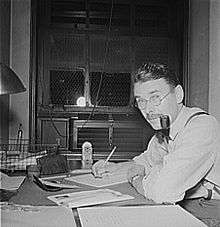Brooks Atkinson
| J. Brooks Atkinson | |
|---|---|
 Drama department of the New York Times newspaper, 1942 September | |
| Born | November 28, 1894 |
| Died | January 14, 1984 (aged 89) |
| Nationality | American |
| Occupation | Theater critic; war correspondent |
| Years active | 1925-1960 |
| Employer | The New York Times |
| Known for | Pulitzer Prize for Correspondence |
Justin Brooks Atkinson (November 28, 1894 – January 14, 1984) was an American theatre critic. He worked for The New York Times from 1925 to 1960. In his obituary, the Times called him "the theater's most influential reviewer of his time."[1]
Biography
Atkinson was born in Melrose, Massachusetts, where, as a boy, he printed his own newspaper (using movable type), and planned a career in journalism. He graduated from Harvard University in 1917, and worked at the Springfield Daily News and the Boston Evening Transcript, where he was assistant to the drama critic. In 1922, he became the editor of the New York Times Book Review, and in 1925 the drama critic.[1]
Atkinson quickly became known for his commitment to new kinds of theatre—he was one of the first critical admirers of Eugene O'Neill—for his interest in all kinds of drama, including off-Broadway productions, and for his wit. In 1928, he said of the new play The Front Page, "No one who has ground his heels in the grime of a police headquarters press room will complain that this argot misrepresents the gentlemen of the press." Atkinson had covered the police beat for the Evening Transcript.
His reviews were reputed to have the power to make or break a new stage production: for example, his panning in 1940 of Lawrence Riley's Return Engagement led to that comedy's closure after only eight performances, this despite the fact that Riley's previous comedy, Personal Appearance, had lasted for over 500 performances on Broadway.
After the bombing of Pearl Harbor in December 1941, Atkinson attempted to enlist in the Navy, but was refused. He requested a reassignment to war coverage, and the New York Times sent him to the front lines as a war correspondent in China, where he covered the war with Japan until 1945. While in China, he visited Mao Tse-Tung in Yenan and was captivated by Mao, writing favorably on the Chinese Communist Party (CCP) movement, and against the Nationalist government of Chiang Kai-shek, which he saw as reactionary and corrupt. After visiting Yenan, he wrote that the CCP political system was best described as an "agrarian or peasant democracy, or as a farm labor party."[2][3] Atkinson viewed the Chinese Communist Party as Communist in name only and more democratic than totalitarian; the Times effusively titled his article Yenan, a Chinese Wonderland City.[2][3]
After the end of the war, Atkinson stayed only briefly in New York before being sent to Moscow as a press correspondent; his work as the Moscow correspondent for the Times earned him a Pulitzer Prize for Correspondence in 1947.[1]
After returning from the Soviet Union, Atkinson was reassigned to the drama desk, where he remained until his retirement in 1960. He is given much credit for the growth of Off-Broadway into a major theatrical force in the 1950s, and has been cited by many influential people in the theatre as crucial to their careers. David Merrick's infamous spoof ad for Subways Are For Sleeping—in which he hired seven ordinary New Yorkers who had the same names as prominent drama critics to praise his musical—had to wait for Atkinson's retirement, because Merrick could not find anyone with the right name. There was only one Brooks Atkinson in New York City.
Atkinson was elected a Fellow of the American Academy of Arts and Sciences in 1960.[4] He came briefly out of retirement in 1965 to write a favorable review of Man of La Mancha; his review was printed on the first page of the show's original souvenir program.
He died on January 14, 1984 at Crestwood Hospital in Huntsville, Alabama.[1]
Legacy
In 1960, the Mansfield Theatre in New York was renamed Brooks Atkinson Theatre in his honor.
References
- 1 2 3 4 Sheppard, Richard K. (January 15, 1984). "Brooks Atkinson, 89, Dead; Key Voice In Drama 31 Years". New York Times. Retrieved 23 July 2014.
Brooks Atkinson, the nation's most influential critic at a time when American drama first emerged as a serious art form, died of pneumonia yesterday at Crestwood Hospital in Huntsville, Ala. He was 89 years old. ...
- 1 2 Knightley, Phillip, The First Casualty: The War Correspondent as Hero and Myth-Maker from the Crimea to Iraq, JHU Press (2004), ISBN 0-8018-8030-0, ISBN 978-0-8018-8030-8, p. 303
- 1 2 Shewmaker, Kenneth E., Americans and Chinese Communists, 1927-1945: A Persuading Encounter, Ithaca, NY: Cornell University Press (1971) ISBN 0-8014-0617-X
- ↑ "Book of Members, 1780-2010: Chapter A" (PDF). American Academy of Arts and Sciences. Retrieved 27 April 2011.
External links
- Brooks Atkinson Theatre Broadway, New York, NY
- Brooks Atkinson papers, 1904-1980, held by the Billy Rose Theatre Division, New York Public Library for the Performing Arts